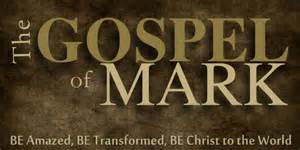
Scripture: Mark 5:1-20
1 They came to the other side of the sea, to the country of Gerasenes. 2 And when he had come out of the boat, there met him out of the tombs a man with an unclean spirit, 3 who lived among the tombs; and no one could bind him any more, even with a chain; 4 for he had often been bound with fetters and chains, but the chains he wrenched apart, and the fetters he broke in pieces; and no one had the strength to subdue him. 5 Night and day among the tombs and on the mountains he was always crying out, and bruising himself with stones. 6 And when he saw Jesus from afar, he ran and worshiped him; 7 and crying out with a loud voice, he said, "What have you to do with me, Jesus, Son of the Most High God? I adjure you by God, do not torment me." 8 For he had said to him, "Come out of the man, you unclean spirit!" 9 And Jesus asked him, "What is your name?" He replied, "My name is Legion; for we are many." 10 And he begged him eagerly not to send them out of the country. 11 Now a great herd of swine was feeding there on the hillside; 12 and they begged him, "Send us to the swine, let us enter them." 13 So he gave them leave. And the unclean spirits came out, and entered the swine; and the herd, numbering about two thousand, rushed down the steep bank into the sea, and were drowned in the sea. 14 The herdsmen fled, and told it in the city and in the country. And people came to see what it was that had happened. 15 And they came to Jesus, and saw the demoniac sitting there, clothed and in his right mind, the man who had the legion; and they were afraid. 16 And those who had seen it told what had happened to the demoniac and to the swine. 17 And they began to beg Jesus to depart from their neighborhood. 18 And as he was getting into the boat, the man who had been possessed with demons begged him that he might be with him. 19 But he refused, and said to him, "Go home to your friends, and tell them how much the Lord has done for you, and how he has had mercy on you." 20 And he went away and began to proclaim in the Decap'olis how much Jesus had done for him; and all men marveled.
Meditation: Do you ever feel driven by forces beyond your strength? A man who was possessed and driven mad by the force of many evil spirits found refuge in the one person who could set him free. Both Luke and Mark in their Gospel accounts of this incident describe this demonic force as a legion (Luke 8:30 and Mark 5:9). A legion is no small force – but an army 6,000 strong! For the people of Palestine who were often hemmed in by occupied forces, a legion – whether human or supernatural – struck terror! Legions at their wildest committed unmentionable atrocities. Our age has also witnessed untold crimes and mass destruction at the hands of possessed rulers and their armies. What is more remarkable – the destructive force of this driven and possessed man, or the bended knee at Jesus' feet imploring mercy and release (Luke 8:28 and Mark 5:18-19)? God's word reminds us that no destructive force can keep anyone from the peace and safety which God offers to those who seek his help. A thousand may fall at your side, ten thousand at your right hand; but it will not come near you. ..Because you have made the Lord your refuge, the Most High your habitation (Psalm 91:7,9).
Jesus took pity on the man who was overtaken by a legion of evil spirits. The destructive force of these demons is evident for all who can see as they flee and destroy a herd of swine. After Jesus freed the demoniac the whole city came out to meet him. No one had demonstrated such power and authority against the forces of Satan as Jesus did. They feared Jesus as a result and begged him to leave them. Why would they not want Jesus to stay? Perhaps the price for such liberation from the power of evil and sin was more than they wanted to pay. The Lord Jesus is ready and willing to free us from anything that binds us and that keeps us from the love of God. Are you willing to part with anything that might keep you from his love and saving grace?
"Lord Jesus, unbind me that I may love you wholly and walk in the freedom of your way of life and holiness. May there be nothing which keeps me from the joy of living in your presence."



.jpg)
.jpg)
.jpg)
+-+Copy.jpg)
.jpg)
.jpg)
+-+Copy.jpg)

.jpg)
.jpg)

